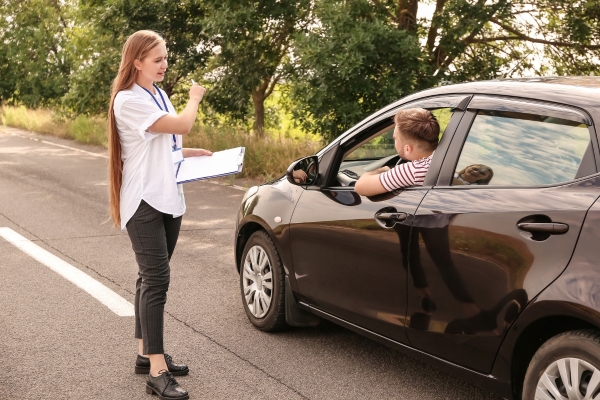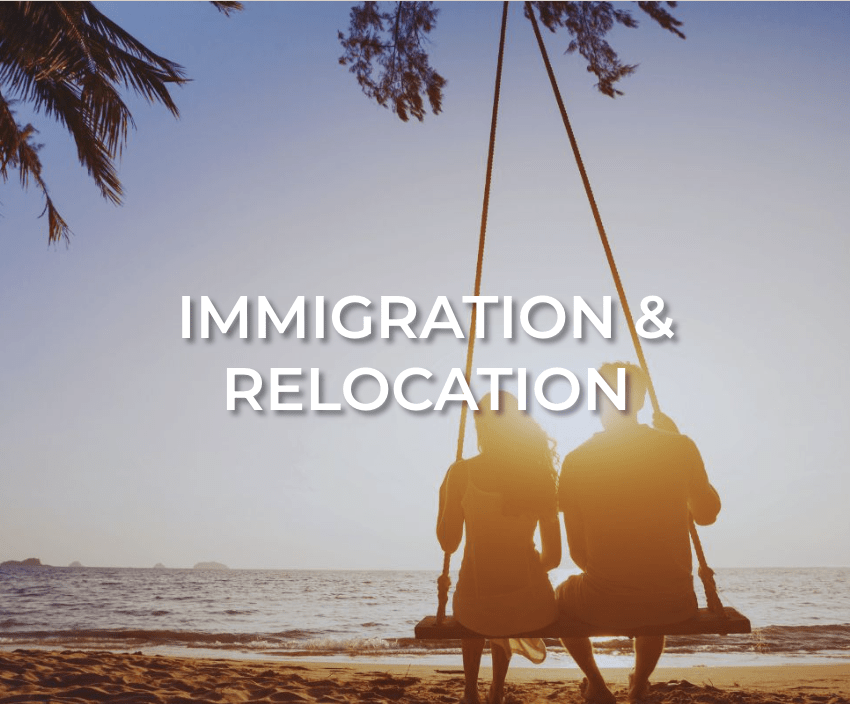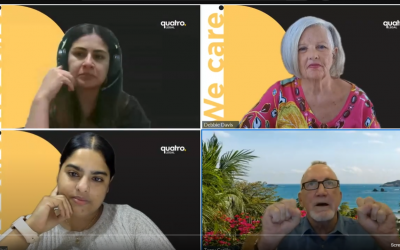

Driving Licenses in Costa Rica: Must-Know Tips for Expats and Visitors
by Quatro Legal Immigration Team | Dec. 10, 2024 | Video, Immigration
Terry:
Hello from Costa Rica. It’s Terry again with Howler Magazine with another edition brought to you by Quatro Legal.
Today we are going to take a look at Costa Rica driving requirements! Not so much how to dodge all the potholes, but how can you stay legal when it comes to your driver’s license? Do you need a driver’s license? With me today is Debbie and she’s got a guest whom she’s going to introduce you to who will talk more about what you need to know about driving in Costa Rica. Welcome, Debbie.
Debbie:
Hi, Terry. How’s everything up in Flamingo?
Terry:
Oh, it’s going great. You know, they got some new road construction that’s been completed, which is going to help with the traffic during high season. So we’re excited about that. Debbie, you’ve been traveling here in Costa Rica for 15 years. I heard someone say that where I’m at in Guanacaste, the roads were not even paved back 15 years ago. So what’s been the biggest challenge for you?
Debbie:
Yeah, I’ve seen pictures of that when everything was much less developed with a lot less traffic and everything was a gravel road. In fact, when we came the first time up to Guanacaste to the area by you, that road from Tamarindo that runs over and connects with Santa Cruz, that was totally gravel. It was horrific, and it’s so, as we would say, “suave” now. It’s very nice. But there’s been a lot of changes.

And I always say in Costa Rica, especially now, most of the roads are pretty good. If you’re going to a tourist places, unless the person has told you it’s not on a paved road, driving to and from there, it’s mostly going to be all paved. Other than that part, kind of between, Arenal and Monte Verde, I don’t know if that’ll ever be paved, but once you get up to Monte Verde, it’s like a super highway.
I don’t think it’s quite as challenging as it used to be. I think the biggest thing that people don’t understand is when we tell them not to drive at night. I’m not quite sure what they think we mean. Really, it’s just the roads in Costa Rica are like roads anywhere out in the country, whether you’re from Europe or the United States or Canada, they’re country roads with no shoulder. What makes it a little bit more difficult is lots of people walk on those roads at all times, day or night, with motorcycles and on foot and bicycles with babies and baskets and everything.
So, it’s really good not to drive at night because you can’t see as well and it’s just not worth it. You know, it’s a little bit frustrating for people because it gets dark at six, and so they want that other three hours for their vacation time. But that’s just the way it is.
The other part is if you’re here, and you’re moving here, or you have moved, or going to move, you’ve got to figure out how to keep your license so you can drive in Costa Rica. That’s why today I really wanted to say to everyone–if you’re watching this today– or, if you’ve got someone you know that has these same questions, please share this with them. Share this video with them, because the internet has all kinds of people asking questions about driving so share this with them, have them contact us, and if you see this on YouTube, please subscribe and also share.
So I want to introduce someone from our office that’s an expert on all of this. She’s here now, and she’s going to tell you everything about the ins and outs of driving in Costa Rica legally. And I’m going to let her introduce herself to you.

Xuala:
Hello, everyone, this is Xuala from Quatro Legal. Thanks, Debbie and Terry, for having me today.
I assist our clients with driver’s license and social security matters. I assist them through all of the process from beginning to end.
Terry:
So it sounds like it could be another thing that’s going to be a lot of steps, a lot of documents and tell us if I wanted to get my Costa Rica driver’s license, tell us what can you do for me?
Because I don’t want to go through a hassle.
Xuala:
Thanks for your question, Terry. Well, 1st, we have to determine if you already have your residency approved, or if you still don’t have your Dimex card on hand. So, in the 1st scenario, if you already have it on hand, then what we do is that we take the clients to the general directorate for transit education for them to get the driver’s license.
Then we take them to the BCR where they will take a picture and some fingerprints and general information, and they will receive their new Costa Rican driver’s license in that appointment. On the other hand, for our clients that don’t have their residency card on hand, they are still eligible to apply, but we just need to bury the requirements a little bit. We need to use the filing receipt confirmation of the residency, but for all of our clients that are thinking about getting their driver’s license and still don’t have their residency approved… Don’t forget that you’re still eligible to apply.
Debbie:
So, I think what you’re saying is you have to have your expediente number first, even if you haven’t been approved yet. Right?
Xuala:
Correct. Yes. And the requirements are very simple. First, we need a medical exam carried out by one of our physicians, then we need an official translation if the driver’s license is issued in a language that is different than Spanish. We always like to carry certified copies of the documents of our clients, so we don’t have any type of issues on the day of our appointment. So the requirements are simple, but as you guys know, working with public institutions is very hard.
Our clients need guidance from someone that knows how to deal with these kinds of decentralized institutions.
Terry:
If people are coming for a vacation, is your driver’s license and passport enough if you’re just here temporarily?
Xuala:
That is also a very good question, Terry. If you’re a tourist and you haven’t applied for residency, you can drive, but, you will have to look at the stamp in your passport to see how long are you allowed to stay in the country because that will be the period of time that you will be allowed to drive as long as you carry your foreign driver’s license and your passport in your car.
Debbie:
Okay. I think this might be something to tell people about, Terry. For people coming here as tourists, that stamp in your passport is very important. People think that no matter when they come into the border they will get the 180-day stamp, but that’s not always the case. It’s going to depend on a few things. One thing it will depend on is if they check your return ticket, then it will be stamped for that return day. If your return ticket is for 180 days, then most likely it will say 180, but you need to check that stamp because you may be thinking you have 180 days and then you get, you know, 60 days in Costa Rica and you find out like, oh, this expires next week.
So you really need to stay on top of that and watch what immigration did. Right?
Xuala:
Correct. Also, you have to check on the country that you’re from and whether it’s included in the 1st group of visas, the 2nd or the 3rd, because sometimes clients think that they all have 180 days, but that’s not the case.It depends on the country the client is from. So that’s also another detail that we take care of.
Terry:
Being an agency that walks expats and new Costa Rica residents through this process… do you have a quick horror story where you heard it and you say, “Ah, you should have called us.” You got any stories like that?
Xuala:
Most definitely. I feel that the language barrier is something that can really complicate things. As you all know, public institutions in Costa Rica are not required to have a 2nd language besides Spanish, so no one speaks English. I’ve heard horror stories of people trying to get a hold of a transit officer who they don’t understand. They also don’t understand the new rules. I feel like the most complicated thing is the language barrier. That’s why we provide bilingual assistance in all the stages of the process.
Communication is key between clients, the public institutions and Quatro Legal.
Terry:
You’re familiar with the latest regulations, including recent changes from last month that many may not know. You have up-to-date information, know the right contacts, and can assist clients needing new driver’s licenses.
How long is a Costa Rica driver’s license valid?

Xuala:
In the first scenario, where clients already have their DIMEX card, the Costa Rican driver’s license will be valid for three years. Upon the first renewal, the second card issued will be valid for six years.
If your residency isn’t yet approved but you have your expediente number, the driver’s license will be valid for six months. However, clients won’t need to repeat the homologation process—just a quick BCR appointment for renewal.
Terry:
No driving tests, right?
Xuala:
Correct! No driving tests or written tests are required for those getting their Costa Rican driver’s license.
Terry:
That’s good to know. It’s been a while—since the 70s—when I got my license. Every day is a challenge here on Costa Rica’s roads. The inverted speed bumps always get me! Some areas are improving, and others are great, but it all depends on where you’re driving.
Debbie, do you have anything to add?
Debbie:
One thing I’d add, especially from an expat perspective, is how essential it is to understand Costa Rica’s unique approach to legal processes. Unlike where many of us come from, where you might go your whole life without needing an attorney, in Costa Rica, nearly every significant step in your journey will require one.
I’ve lived the expat life for a while, and I can personally vouch for this. When I went through the process for my driver’s license, I made some mistakes that cost me time and money—mainly because I tried to handle it myself and also relied on an attorney who wasn’t fully familiar with what was required.
Here’s what happened:
First, I went to Liberia without an appointment, thinking I’d be fine. That was a two-hour drive there and back. The answer? A firm “no.” Lesson learned.
For the second trip, I rented another car—since we only have a quad that’s not suitable for long distances—and went to Nicoya with everything I thought I needed: my translated driver’s license, all the paperwork, and everything in order. Or so I thought.
I waited my turn, and the staff were very kind, but once again, I was told no. This time, the issue was that my attorney hadn’t provided an official translation. In Costa Rica, “official” means a certified translator, not someone using Google Translate or even someone bilingual.
By the third attempt, I finally got it right. But by then, I’d spent over $500 on rental cars alone. Had I known about Quatro Legal back then, I would’ve saved so much frustration and money by getting proper help from the start.
It’s a good lesson for anyone navigating these processes—get the right help early on. That’s why we’re here, and I hope this story helps someone avoid the same mistakes.
I know Xuala has even crazier stories, but that’s my personal experience!

Xuala:
Terry, I want to mention that we provide this service across the entire country. We have experience in all 13 offices that handle this process. This gives our clients confidence in having a smooth experience obtaining their driver’s license.
Terry:
That’s great! Your motto is, “We care,” and it’s clear how true that is. When it comes to navigating government agencies like this, having a resource like Quatro Legal really takes the stress out of the process.
In the U.S., the DMV is often the punchline of jokes. In fact, in a famous cartoon, Costa Rica’s mascot—the sloth—was humorously depicted as the DMV employee, poking fun at how slow the process can be. While dealing with the DMV in the States is a challenge, it’s a relief to have a knowledgeable team like Quatro Legal to guide us through getting a driver’s license in Costa Rica.
Does anyone have anything to add?
Xuala:
For anyone watching this video, if you have questions about the process, we offer courtesy calls to guide you through each step. With our experience, we can ensure the process is as straightforward as possible.
Thank you, Debbie and Terry, for giving us this space. It’s so important to share how these regulations play out in practice, not just in theory.
Debbie:
Thanks for joining us, Xuala. This was great!
Terry:
Yes, thank you! And don’t forget to check out Howler Mag. The next edition dives into topics like dealing with screaming motorcycles on Costa Rican roads, which is definitely part of the Pura Vida experience!
Thank you both for being here, and remember—having the right information makes everything flow better. Thank you!
Disclaimer: The information provided in this blog post is for general informational purposes only and is not intended to constitute legal advice. While we strive to ensure the accuracy and timeliness of the content, laws and regulations are subject to change. For the most accurate and up-to-date information, please contact our office directly. Some images may be AI generated.
Get To Know Quatro Legal

We’re bringing empathy and excellence back to legal counseling. Quatro Legal is built on a bedrock of kindness, a passion for service, and a commitment to guiding you through your legal challenges with ease.
OUR SERVICES
EXPLORE BY
category
REAL
ESTATE
CORPORATE
COSTA RICA
LIFESTYLE
LABOR & EMPLOYMENT
CLIENT
TESTIMONIALS
FREE TRADE
REGIME
All Rights Reserved 2024 | Privacy









